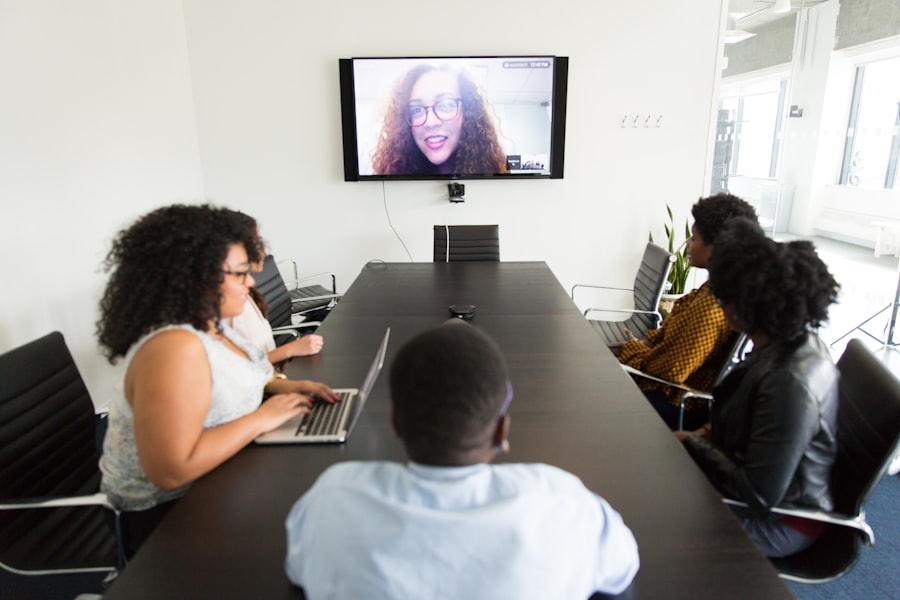In the current digital era, remote work has become increasingly prevalent, leading to a heightened significance of professional relationships in virtual work environments. Establishing and nurturing robust professional connections is essential for workplace success, particularly in remote settings where in-person interactions are limited. Professional relationships form the basis for effective teamwork, communication, and trust, contributing significantly to a positive and productive work atmosphere.
In remote work scenarios, where team members may be geographically dispersed across various locations and time zones, the necessity for strong professional relationships is amplified. Without daily face-to-face interactions, remote workers must rely on these professional connections to maintain engagement, motivation, and a sense of connection to their work and colleagues. Consequently, recognizing the importance of professional relationships in remote work environments is critical for both individual and organizational success.
Key Takeaways
- Building and maintaining professional relationships is crucial in a remote work environment for collaboration and productivity.
- Trust and communication are essential for establishing strong professional relationships in a remote setting.
- Technology can be used to facilitate connection and collaboration among remote professionals.
- Setting clear expectations and boundaries is important for maintaining healthy remote professional relationships.
- Virtual networking and socializing can help nurture and strengthen professional relationships in a remote work environment.
Establishing Trust and Communication in Remote Professional Relationships
Establishing Trust in a Remote Setting
Trust is the foundation of any successful relationship, and it is especially important in a remote setting where team members may not have the opportunity to interact face-to-face on a regular basis. Building trust in a remote work environment requires consistent and transparent communication, reliability, and accountability. Team members must be able to rely on each other to fulfill their responsibilities and meet deadlines, and this requires open and honest communication.
Clear Expectations and Goals
Establishing clear expectations and goals for each team member can help build trust by ensuring that everyone is on the same page and working towards a common objective. This clarity helps to prevent misunderstandings and ensures that each team member knows what is expected of them.
Effective Communication in a Digital Age
Effective communication is essential for building strong professional relationships in a remote work environment. Without the ability to communicate in person, remote workers must rely on digital tools such as email, instant messaging, video conferencing, and project management platforms to stay connected with their colleagues. It is important for remote workers to be proactive in their communication efforts, reaching out to their colleagues regularly to provide updates, ask for feedback, and offer support. By prioritizing trust and communication, remote workers can lay the groundwork for strong professional relationships that will contribute to their success in a remote work environment.
Utilizing Technology to Foster Connection and Collaboration

In a remote work environment, technology plays a crucial role in fostering connection and collaboration among team members. With the help of digital tools and platforms, remote workers can stay connected with their colleagues, collaborate on projects, and share information seamlessly regardless of their physical location. Video conferencing tools such as Zoom, Microsoft Teams, and Google Meet allow remote workers to hold virtual meetings and discussions, providing an opportunity for face-to-face interaction even when team members are miles apart.
Instant messaging platforms like Slack and Microsoft Teams enable real-time communication, making it easy for remote workers to ask questions, share updates, and collaborate on tasks. Project management tools such as Asana, Trello, and Jira help remote teams stay organized and track their progress on various projects. By leveraging these technological tools, remote workers can overcome the barriers of distance and time zones to foster connection and collaboration with their colleagues.
Additionally, technology can also be used to create virtual water cooler moments, such as virtual coffee breaks or happy hours, where team members can socialize and bond with each other outside of work-related tasks. By utilizing technology effectively, remote workers can create a sense of community and belonging within their team, leading to stronger professional relationships and increased productivity.
Setting Clear Expectations and Boundaries for Remote Professional Relationships
In a remote work environment, setting clear expectations and boundaries is essential for maintaining healthy professional relationships among team members. Without the structure of a traditional office setting, remote workers must establish clear guidelines for communication, availability, and work hours to ensure that everyone is on the same page. Setting clear expectations for each team member’s responsibilities, deadlines, and goals can help prevent misunderstandings and conflicts down the line.
Additionally, establishing boundaries for communication and availability can help remote workers maintain a healthy work-life balance and prevent burnout. For example, team members may agree on specific hours during which they are available for meetings and collaboration, allowing everyone to have dedicated time for focused work without interruptions. It is also important for remote workers to respect each other’s boundaries and be mindful of their colleagues’ schedules and time zones when scheduling meetings or sending messages.
By setting clear expectations and boundaries for remote professional relationships, team members can create a supportive and respectful work environment that fosters strong professional relationships.
Nurturing Professional Relationships through Virtual Networking and Socializing
In a remote work environment, nurturing professional relationships through virtual networking and socializing is essential for building a sense of camaraderie and connection among team members. While traditional networking events and social gatherings may not be feasible in a remote setting, there are still plenty of opportunities for remote workers to connect with their colleagues on a personal level. Virtual networking events such as webinars, industry conferences, and online workshops provide opportunities for remote workers to expand their professional network and connect with like-minded professionals in their field.
Additionally, socializing events such as virtual coffee breaks, game nights, or book clubs can help remote workers bond with their colleagues outside of work-related tasks. These virtual networking and socializing opportunities allow remote workers to build rapport with their colleagues, share common interests, and develop a sense of community within their team. By nurturing professional relationships through virtual networking and socializing, remote workers can create a supportive and inclusive work environment that promotes collaboration and teamwork.
Addressing Challenges and Conflict in Remote Professional Relationships

Challenges in Remote Professional Relationships
In any workplace setting, challenges and conflicts are inevitable, and this holds true for remote professional relationships as well. When working remotely, team members may face challenges such as miscommunication, misunderstandings, or differing work styles that can lead to conflict within the team. It is important for remote workers to address these challenges proactively and constructively to maintain healthy professional relationships.
Open and Honest Communication: A Key to Conflict Resolution
One way to address challenges and conflict in remote professional relationships is through open and honest communication. When conflicts arise, team members should address them directly with the individuals involved, seeking to understand each other’s perspectives and find mutually beneficial solutions. It is also important for remote workers to practice active listening and empathy when addressing challenges or conflicts with their colleagues.
Conflict Resolution Techniques for Remote Workers
By approaching these situations with an open mind and a willingness to find common ground, remote workers can navigate challenges effectively while preserving their professional relationships. Another strategy for addressing challenges and conflict in remote professional relationships is through the use of conflict resolution techniques. Remote workers can benefit from learning how to manage conflict constructively by using techniques such as active listening, reframing perspectives, finding common ground, and seeking compromise.
Maintaining Healthy Professional Relationships
Additionally, involving a neutral third party such as a manager or HR representative can help facilitate constructive discussions and find resolutions to conflicts within the team. By addressing challenges and conflict proactively through open communication and conflict resolution techniques, remote workers can maintain healthy professional relationships that contribute to a positive work environment.
Sustaining Remote Professional Relationships through Regular Check-Ins and Feedback
In a remote work environment, sustaining professional relationships requires regular check-ins and feedback to ensure that team members stay connected and engaged in their work. Regular check-ins provide an opportunity for remote workers to touch base with their colleagues, share updates on their projects, discuss any challenges they may be facing, and offer support to one another. These check-ins can take the form of one-on-one meetings, team huddles, or informal catch-ups to maintain a sense of connection within the team.
Additionally, providing regular feedback to colleagues can help sustain professional relationships by fostering growth, development, and mutual respect within the team. By offering constructive feedback on each other’s work, remote workers can demonstrate their investment in each other’s success while also improving the quality of their collaboration. Furthermore, sustaining professional relationships in a remote work environment also involves recognizing and celebrating achievements within the team.
Whether it’s acknowledging a job well done on a project or celebrating personal milestones such as birthdays or work anniversaries, taking the time to recognize achievements can help foster a positive and supportive work culture among remote workers. By sustaining professional relationships through regular check-ins, feedback, and recognition of achievements, remote workers can create a cohesive and motivated team that thrives in a remote work environment. In conclusion, professional relationships play a crucial role in the success of remote work environments.
By establishing trust and effective communication, utilizing technology to foster connection and collaboration, setting clear expectations and boundaries, nurturing relationships through virtual networking and socializing, addressing challenges and conflict constructively, and sustaining relationships through regular check-ins and feedback; remote workers can build strong professional relationships that contribute to a positive work environment and overall success in their roles. Understanding the importance of professional relationships in a remote work environment is essential for both individual growth and organizational success in today’s digital age.
If you’re looking to advance your career and stay ahead in your industry, you may find this article on industry insights helpful. It provides valuable information on what you need to know to stay ahead in your field. Check it out here.
FAQs
What are professional relationships?
Professional relationships are the connections and interactions between individuals in a professional setting. These relationships are built on trust, respect, and effective communication.
Why is it important to build and maintain professional relationships remotely?
Building and maintaining professional relationships remotely is important because it helps to establish trust, collaboration, and a sense of community among team members who may be geographically dispersed. It also contributes to a positive work environment and can lead to increased productivity and job satisfaction.
What are some tips for building professional relationships remotely?
Some tips for building professional relationships remotely include regular communication through video calls, phone calls, and emails, actively listening to colleagues, showing empathy and understanding, and finding common interests to bond over.
How can professional relationships be maintained remotely?
Professional relationships can be maintained remotely by scheduling regular check-ins with colleagues, providing support and recognition, being responsive and reliable, and seeking feedback on how to improve collaboration and communication.
What are the benefits of maintaining professional relationships remotely?
The benefits of maintaining professional relationships remotely include increased trust and loyalty among team members, improved teamwork and collaboration, enhanced job satisfaction, and a positive impact on overall productivity and performance.



